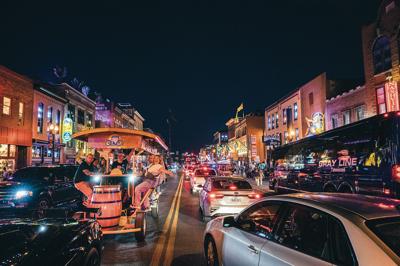Metropolitik is a recurring column featuring the Scene’s analysis of Metro dealings.
The entertainment transportation vehicle industry — a provisional legal term for the buses and barges that move tourists through downtown, also sometimes known as “transpotainment” — is ensnared in a tangle of money and politics three years into the city’s attempt to bring order to Lower Broadway’s chaos.
Metro permits 27 ETV operators, from the Honky Tonk Party Express (17 permits) to the Music City Party Fire Engine, a single-permit outfit registered to a residential street off Eighth Avenue. A few major players dominate an industry that many view as a symbol of downtown debauchery, responsible for terrorizing office tenants and harassing pedestrians. Others see it as a cash cow (one operator estimates ETVs bring in $50 million in annual revenue) essential to Nashville’s tourism allure, spoiled by a few bad actors.
The ETV permit renewal deadline is March 25. Permits will be reviewed in May at a hearing in front of the Transportation Licensing Commission, the Metro body tasked with ETV oversight in 2021. Meanwhile, Diana Alarcon, director of the Nashville Department of Transportation, has led a not-so-subtle campaign against the party vehicle industry, culminating in a tense December 2023 meeting in which Alarcon dismissed its tourists as rude, obnoxious and loud. Last spring, Alarcon pulled up for a director’s report at a Transportation Licensing Commission meeting; she’s participated in discussion as an informal member ever since, often irking sitting commissioners.
Owners have pleaded with the city for a fair chance to do business. They criticize the city’s rules, which they say unfairly privilege sightseeing tours, change often and dictate strict pickup and dropoff locations, operation hours, behavior standards and route options. In particular, they blame Alarcon for a personal crusade against party vehicles. Fed up with the city, big ETV (led by The Nashville Tractor owner Michael Winters) enlisted power-player lobbying firm McMahan, Winstead & Richardson to push a total rewrite of ETV rules at the state level early this year. The effort died in March.
Around the same time, a tweak about permit renewals pushed by Alarcon out of the Transportation Licensing Commission and carried by East Nashville Councilmember Sean Parker was suddenly pulled from Metro Council on first reading, a procedural fumble that indicates confusion and disagreement between Parker, Alarcon and the mayor’s office.
Alarcon’s presence at board meetings has heightened pressure for commissioners, whom NDOT has pushed to limit permits despite little or no concrete information about the industry.
“Do we know how many are operating at any given time?” Commissioner Carey Rogers asked Alarcon in March.
Top state lawmaker curbs effort to take over transpotainment after a kindly worded email from O’Connell
“That is one of the things we are actually going to be doing in April,” Alarcon responded. “We’ve been having meetings with ETV and sightseeing companies, and it was raised by one of the ETV companies. This is later on in your agenda —”
“So the answer is no,” Rogers cut in.
“We do know how many permits are issued,” Alarcon told the commission. “We have some ideas, but we don’t have some hard data.” She then shared NDOT’s plan to count ETVs by drone in April.
Boosters and politicians have struggled with the limits of downtown debauchery since before the party started. Nashville tourism is a money fountain, international ambassador, cultural emblem, citywide punching bag and magnet for investment dollars, high-profile events and new residents all at once. It teems with people and intoxicants, and those who venture into the industry’s depths risk real danger — recent lawsuits over violent bar bouncers and the widely publicized disappearance of college student Riley Strain add harrowing detail to the underside of a good time.
Mayor Freddie O’Connell (then a councilmember representing District 19, which contains Lower Broadway) led the city’s first pass at regulating entertainment transportation in 2021. At the time, Bob Mendes — who joined O’Connell’s mayoral administration last year after two terms as an at-large councilmember — added a prescient note of caution before O’Connell’s bill passed.
“Regulation is needed,” Mendes said at the time. “On the downside, I am a little disappointed at what feels like the opaqueness of the negotiations so far. This feels like it’s essentially been one or two council people, every lobbyist in town, the major downtown organizations, and the rest of us are along for the ride — due to public pressure, we have to vote for it. We’re putting enormous new responsibilities on the TLC.”
Nashville’s Transportation Licensing Commission had previously been a sleepy regulator over wreckers, taxis, limos and horse-drawn carriages. Codifying the party vehicle industry has added accountability for the Transpotainment Wild West of pre-2021, ridiculed by operators and politicians alike as a time when anyone could hook anything to a trailer hitch and charge unwitting patrons for a ride. It has also plunged the volunteer TLC into a regulation whirlpool to referee the bureaucrats, pissed-off business owners and feuding politicians watching a party that just won’t stop.






